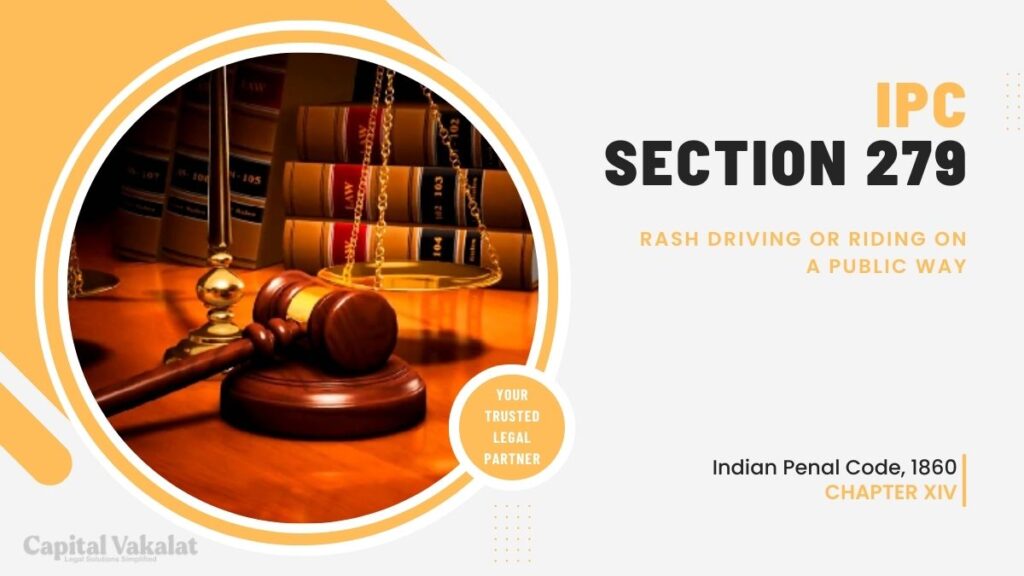In this comprehensive article, we’ll delve into the legal intricacies of Section 279 of the Indian Penal Code (IPC), which pertains to “Rash Driving or Riding on a Public Way.” This legislation plays a pivotal role in maintaining road safety and holding individuals accountable for their actions on public roads.

We’ll explore the various aspects of this provision, its implications, and the consequences it brings to those found guilty. Join us as we unravel the legal framework surrounding Section 279 IPC.
Introduction to Section 279 IPC
Section 279 of the Indian Penal Code is a legal provision designed to address the menace of rash driving and riding on public roads. It has been framed to ensure road safety and to protect the lives of those using the roads. Understanding the implications of this provision is crucial, as it directly affects individuals who fail to adhere to responsible and safe road behavior.
Defining Rash Driving or Riding
Before delving deeper into Section 279 IPC, it is essential to understand what qualifies as “rash driving” or “rash riding.” The provision considers actions that endanger the safety of others on the road as rash. This includes overspeeding, reckless overtaking, driving under the influence, and more. Recognizing these behaviors is essential in avoiding legal consequences.
Elements of Section 279
Section 279 IPC comprises several essential elements that need to be satisfied for an individual to be found guilty. These elements include the willful or negligent act, dangerous consequences, and the involvement of a public way. Understanding these components is crucial to comprehend the legal aspect fully.
Legal Consequences
Violating Section 279 IPC carries significant legal consequences. Those found guilty can face imprisonment, fines, or both. The severity of the punishment depends on the nature of the offense and the harm caused. It’s important to be aware of these penalties to act responsibly on the road.
Judicial Interpretation
To gain a deeper understanding of how Section 279 IPC is applied, we can examine past court cases and judgments related to rash driving. By doing so, we can learn from real-life scenarios and their legal outcomes, helping us understand the practical implications of this provision.
The Importance of Road Safety
Section 279 IPC plays a crucial role in maintaining road safety and protecting lives. By enforcing responsible driving and riding, this provision contributes to a safer road environment for everyone. Comprehending its significance is vital in promoting responsible road behavior.
Preventative Measures
One of the best ways to avoid falling afoul of Section 279 IPC is to adopt preventative measures. This includes following traffic rules, avoiding distractions while driving, and respecting the rights of other road users. By practicing safe and responsible driving, individuals can reduce the risk of legal repercussions.
Legal Rights and Responsibilities
As road users, it’s essential to be aware of our rights and responsibilities. Understanding the law and abiding by it not only ensures our safety but also protects us from legal consequences. This section will outline the rights and duties that individuals have while using public roads.
The Role of Law Enforcement
Law enforcement agencies play a critical role in implementing Section 279 IPC. They are responsible for enforcing traffic regulations, conducting investigations, and ensuring that those who violate the law are held accountable. Understanding how law enforcement operates in this context is essential.
Conclusion
In conclusion, Section 279 IPC addresses the critical issue of rash driving and riding on public roads. It serves as a legal framework to ensure road safety and accountability for irresponsible actions. By understanding this provision and following responsible road behavior, individuals can contribute to a safer road environment for all.
Frequently Asked Questions
What constitutes “rash driving” under Section 279?
Rash driving includes actions that endanger the safety of others on the road, such as overspeeding, reckless overtaking, and driving under the influence.
What are the potential legal consequences of violating Section 279 IPC?
Violators can face imprisonment, fines, or both, depending on the nature of the offense and the harm caused.
How can individuals avoid falling afoul of Section 279 IPC?
Individuals can avoid legal repercussions by practicing safe and responsible driving, following traffic rules, and respecting the rights of other road users.
What role does law enforcement play in implementing Section 279 IPC?
Law enforcement agencies are responsible for enforcing traffic regulations, conducting investigations, and ensuring that violators of Section 279 are held accountable.